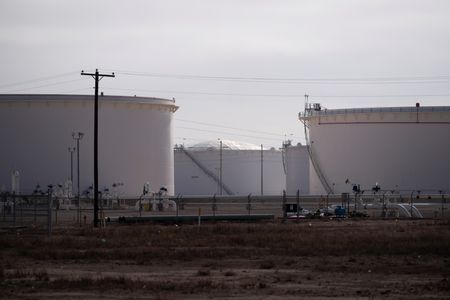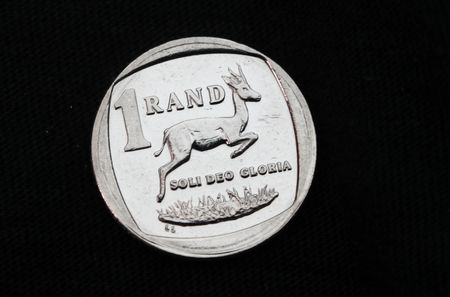By Georgina McCartney
HOUSTON (Reuters) -Oil prices fell on Monday, as the latest European sanctions on Russian oil are expected to have minimal impact on supplies, while U.S. tariffs stoked demand concerns.
Brent crude futures dropped 26 cents, or 0.4%, to $69.02 a barrel by 11:08 a.m. EDT (1508 GMT), while U.S. West Texas Intermediate crude slipped by 24 cents, or 0.4%, to $67.10.
The European Union on Friday approved the 18th package of sanctions against Russia over the war in Ukraine, which also targeted India’s Nayara Energy, an exporter of oil products refined from Russian crude.
“The market right now thinks that supply will still make it to market in one way, shape or another, there is not too much concern,” said John Kilduff, a partner at Again Capital in New York.
Kremlin spokesperson Dmitry Peskov said on Friday that Russia had built up a certain immunity to Western sanctions.
The EU sanctions followed U.S. President Donald Trump’s threats last week to impose sanctions on buyers of Russian exports unless Russia agrees to a peace deal within 50 days.
ING analysts said the part of the package likely to have an effect is the EU import ban on refined products processed from Russian oil in third countries, though it said it could prove difficult to monitor and enforce.
Iran, another sanctioned oil producer, is due to hold nuclear talks with Britain, France and Germany in Istanbul on Friday, an Iranian foreign ministry spokesperson said on Monday. That follows warnings by the three European countries that a failure to resume negotiations would lead to international sanctions being reimposed on Iran.
In the United States, the number of operating oil rigs fell by two to 422 last week, the lowest total since September 2021, Baker Hughes said on Friday.
“Oil-focused drilling is expected to remain at subdued levels through the balance of the year,” StoneX analyst Alex Hodes said in a note on Monday.
“We aren’t anywhere close to prices that merit a significant pullback in investment though,” Hodes added.
Meanwhile, U.S. tariffs on EU imports are set to kick in on August 1, though U.S. Commerce Secretary Howard Lutnick said on Sunday that he was confident the United States could secure a trade deal with the bloc.
“The U.S. tariffs are potentially negative for oil demand and economic activity. We haven’t seen it yet, but it is in the cards,” Again Capital’s Kilduff said.
While tariff concerns will continue to add pressure in the lead up to the August 1 deadline, some support may come from oil inventory data if it shows tight supply, said IG market analyst Tony Sycamore.
“It feels very much like a $64-$70 range in play for the week ahead.”
Brent crude futures have traded between a low of $66.34 a barrel and a high of $71.53 after a ceasefire deal on June 24 halted the 12-day Israel-Iran war.
(Reporting by Georgina McCartney in Houston, Anna Hirtenstein in LondonAdditional reporting by Ahmad Ghaddar in London, Florence Tan in Singapore and Sam Li in BeijingEditing by David Goodman, Emelia Sithole-Matarise and Marguerita Choy)







